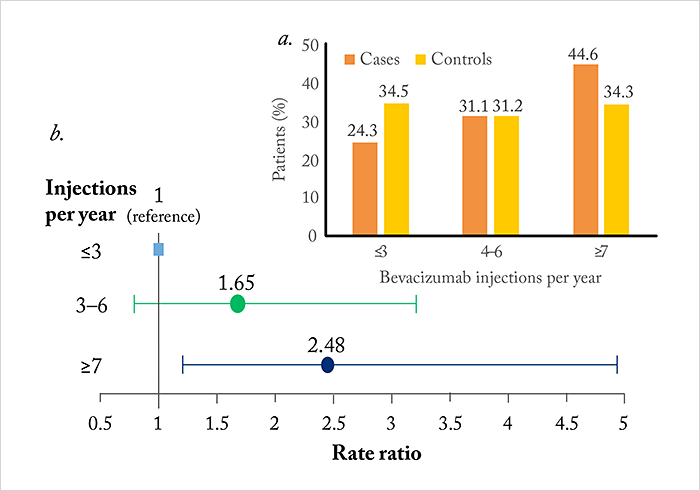
It’s now acknowledged that intravitreal injections of anti-VEGF agents do carry a small risk of increasing patients’ IOP – sometimes transiently, sometimes sustained. Many patients receive these injections monthly, so the question is: how serious can it get? To find out, a team of Vancouver-based ophthalmologists and researchers got on the case (1).
The team had access to large, linked, population-based heath databases (supported by the British Columbia Ministry of Health) and searched for all patients with ophthalmic issues that had received intravitreous bevacizumab for exudative AMD during the years of 2009–2013. Next, they identified a subset of interesting records – ones that contained glaucoma surgical codes for trabeculectomy, complicated trabeculectomy, glaucoma drainage devices, and cycloablative procedures (n=74). Ten controls were identified for each of the 74 cases and matched for age, prexisting conditions, calendar time, and follow-up time for each case (n=740). Both cases and controls were stratified by the number of bevacizumab injections received per year: ≤3, 4–6, and ≥7.
After adjusting for comorbidities, the proportion of patients who received ≥7 injections per year was 10.3 percent greater than the proportion in the control group (44.6 vs. 34.3 percent; Figure 1a). For the case-control analysis, patients who received three or fewer injections per year served as the reference category; here, the adjusted rate ratio (RR) of glaucoma surgery among those who received seven or more injections per year was 2.48 (95% CI, 1.25–4.93), with the RR for patients receiving 3–6 injections per year being 1.65 (0.84–3.23; Figure 1b). In an accompanying editorial, Apte et al. (2) noted, “most patients who receive intravitreous anti-VEGF injections do not develop ocular hypertension or glaucoma.” However, the authors also stated that it was “prudent to observe all patients receiving intravitreous anti-VEGF injections for evidence of elevated IOP and glaucoma” and that such observation was “especially important for those patients with preexisting ocular hypertension or glaucoma.”
References
- BD Eadie et al., “Association of repeated intravitreous bevacizumab injections with risk for glaucoma surgery”, JAMA Ophthalmology, [Epub ahead of print] (2016). PMID: 28301639. RS Apte et al., “Anti-VEGF injections and glaucoma surgery”, JAMA Ophthalmology, [Epub ahead of print] (2016). PMID: 28301640.
